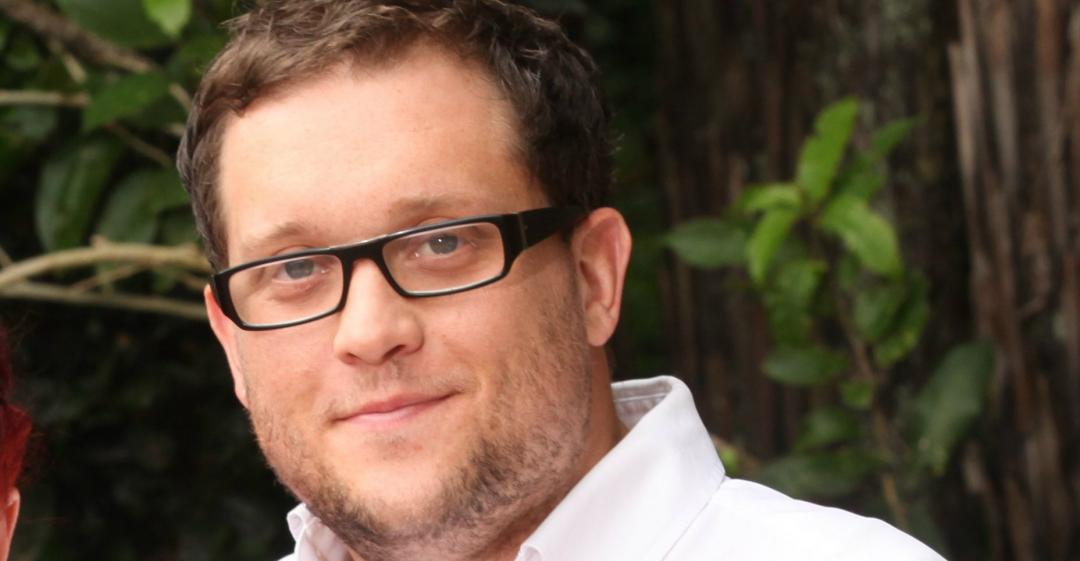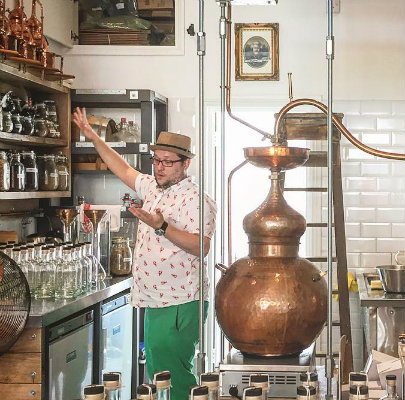“It was more a case of letting my hobby become my new career.”

What work were you doing previously?
I was a brand ambassador for Diageo, which involved running events and marketing initiatives for drinks brands.
I've been a bar manager for a number of different bars / brands globally, largely in Bristol but also in Australia and New Zealand.
What are you doing now?
Along with my business partner, I run a small, independent distillery and bar in Bristol, called Psychopomp.
We use small, handmade copper pot stills to produce craft-distilled gin in small batches and limited quantities. We create classic and seasonal recipes for our gin-loving customers, and bespoke recipes with our partners.
How did you feel in your work before you decided to make a change?
Overall, I enjoyed the roles I worked in.
The drinks industry is a tough one – people are overworked and underpaid – and I'm a big believer that if you don't enjoy it you should change. It's too hard to fake it in this industry! Plus I've always enjoyed new challenges.
Why did you change?
It was more a pull factor of setting up a new brand and being my own boss, rather than the push of wanting to leave.
We were running Psychopomp as a hobby business. As things grew, it needed more of a full-time focus, so it was that which helped me make the switch.
When was the moment you decided to make the change?
It did take a while – we were on the precipice of needing to expand for a while, but we held the business back so we could run it at a pace which suited me while I was working.
But when we ran out of space in the basement, we recognised we needed a bigger site. As the overheads grew it became sensible for me to work on it full time.
How did you choose your new career?
It was less of a case of choosing a new career and more a case of letting my hobby become my new career.
Are you happy with the change?
Yes, very much so.
I really enjoy what I'm doing now. I'm not one of those people who ever envisaged running my own business, despite people always saying to me "You must want your own bar one day?" That was never really the case – I was always happy working for other people.
However, now I'm doing it, I love it. I love being able to set the tone and I really like the ethos of what we've created.
What do you miss and what don't you miss?
Running bars is a younger man's game.
I enjoyed it whilst I was in it but I don't hanker to go back to it. As you get older, you move on – what I want out of life has changed.
How did you go about making the shift?
In reality there was no conscious shift.
When we started out, we always tried to be slightly behind demand; we always planned to take small steps.
We kept customer levels low to a point where we were comfortable that we could sustain it; then, as demand grew to a point where we had over 100 clients and we needed more space, that was the catalyst for shifting from hobby to career.
What didn't go well? What 'wrong turns' did you take?
We didn't have any disaster stories as we grew things slowly; however, the business is certainly run differently now to how we envisaged it would be.
I believe you need to be adaptable and see how the market responds to you. We'd imagined we'd be running cocktail events to promote the brand, but as we developed we came to feel that wouldn't be right for us. Similarly, we didn't think we'd be running a bar in-house, but the new site lent itself to that, so we went with it.
Certainly, some ideas that were on the plan when we set out have never made it to fruition, but lots of others have come along on the way – it's all part of the adventure.
How did you handle your finances to make your change possible?
My business partner maintained his career, so that the business wasn't suddenly needing to support two people.
I have no family to support and no expensive lifestyle to sustain – plus working in the drinks industry wasn't exactly well paid, so let's just say I'm used to living a frugal lifestyle!
When we took out the lease on the premises we're now using, we knew the business was already generating enough income to sustain the rent, so we only made further steps when the business could justify and afford the changes.
What was the most difficult thing about changing?
Honestly, there wasn't anything that was especially difficult.
I've enjoyed each step. We've been really lucky that we've been able to grow at a pace we could manage. Of course, there have been some very long hours, but I haven't disliked that – it's part of my background and I'm used to it. The difference is, now I'm doing it for me and my team, not for someone else!
What help did you get? 
I didn't get any specific external advice, except for legal advice regarding the lease on the property and licensing arrangements.
My background in running other people's businesses definitely helped, but (and most importantly) we consulted our wives! Having the advice and support of partners / friends and family is crucial.
What resources would you recommend to others?
ViewVo – gain that insight into the business to give you the data to make the decision if it's the right move for you.
I've agreed to be a mentor on the site to anyone else looking to set up a brewing / drinks business. I don't think anything else is a substitute for the hands-on knowledge and insight a day spend shadowing someone in the field can give you.
What have you learnt in the process?
Always have a nice big line on cost projections for miscellaneous expenses – there are always costs you don't expect.
Never plan to run tight to a budget – we had some major flooring issues when we took on our site and ended up over budget on the build.
Make allowances for things going wrong, so that when they do go wrong it's not a disaster (and you can pat yourself on the back for having planned for it).
What would you advise others to do in the same situation?
If you have a passion and an idea then do your research and go for it – running your own business is highly rewarding.
Overall, I've found the process to be very positive. You only get one go at life – take risks and have an adventure.
To learn more about shadowing opportunities with ViewVo, visit www.viewvo.com.
To find out more about Danny's business, visit www.microdistillery.co.uk.
What lessons could you take from Danny's story to use in your own career change? Let us know in the comments below.



